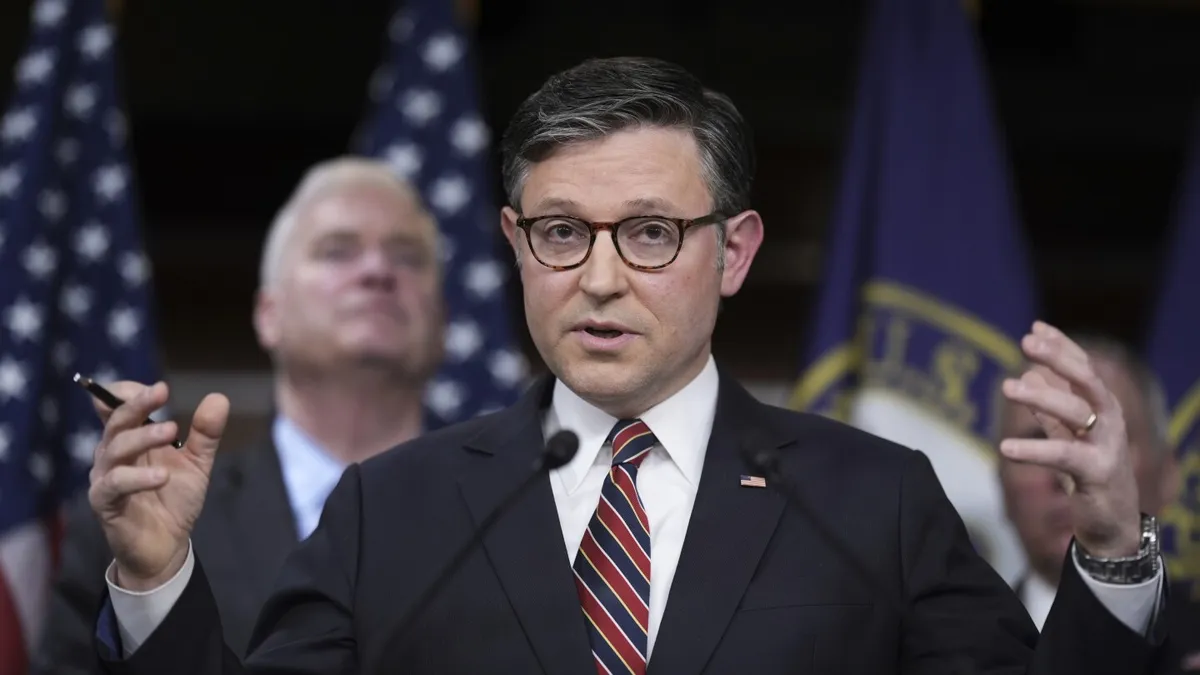
In a dramatic turn of events, House Speaker Mike Johnson was forced to halt votes on a crucial Republican budget framework, with plans to revisit the issue on Thursday. The decision came after a tense night of negotiations aimed at appeasing GOP holdouts who are reluctant to support a package that proposes trillions of dollars in tax breaks without implementing deeper spending cuts. Despite a strong push from President Donald Trump, the proposal struggled to gain traction among Republican lawmakers.
Johnson's inability to secure the necessary votes highlights the divisions within the Republican Party. The Speaker had to abandon the planned vote on Wednesday as a group of conservative Republicans, particularly members of the ultraconservative Freedom Caucus, expressed their opposition. They argued that the proposed budget does not go far enough in reducing spending, a concern that could jeopardize Trump's vision for what he describes as the "big, beautiful bill." Johnson, a Republican from Louisiana, remarked after a late-night meeting, "The president is very anxious for us to get this done," indicating the pressure he faces to deliver results.
The stakes are high for Johnson as he navigates this complex political landscape. The budget framework is a cornerstone of the Republican agenda, aimed at facilitating tax cuts and reducing the size of the federal government. A failed vote could significantly undermine the party's positioning, especially with the economy already in turmoil due to Trump's ongoing trade wars. Johnson's slim majority means he can afford to lose only a few votes, making every dissenting voice critical.
Throughout the night, Johnson convened a private meeting with a select group of Republicans to explore alternatives that might satisfy the dissenters. He mentioned having a brief conversation with Trump during the discussions, as they sought to identify the minimal number of cuts and savings necessary to garner broader support. Options under consideration include amending the Senate's budget bill or establishing a conference committee to address the differences.
Despite these efforts, many House conservatives remained skeptical. Notable figures such as Rep. Chip Roy from Texas publicly criticized the budget, stating, “The Math Does Not Add Up,” and pledged not to support it. Rep. Andy Harris from Maryland, chair of the Freedom Caucus, led discussions with Senate leadership to express their demand for more substantial cuts to prevent increasing deficits. Senate Majority Leader John Thune acknowledged the need for collaboration but dismissed the idea of the House sending back an amended version, which could lead to prolonged voting sessions.
The negotiation process is still in its infancy, with weeks, if not months, of work ahead before a final legislative product is achieved. Although Democrats lack the votes to halt the package, they have voiced strong opposition. House Democratic Leader Hakeem Jeffries condemned the proposed budget as reckless, emphasizing that it prioritizes tax breaks for the wealthy at the expense of everyday Americans struggling to make ends meet.
At the heart of the budget framework is the Republican objective to maintain the tax cuts enacted in 2017 during Trump's first term, while potentially introducing new tax relief promised during the campaign. This includes eliminating taxes on tipped wages and Social Security income, which could inflate the budget's cost to approximately $7 trillion over the next decade. Additionally, the framework proposes significant budget increases—around $175 billion—to fund Trump's plans for mass deportation and bolster military spending.
The budget proposal also aims to raise the nation's debt limit, allowing for increased borrowing to meet financial obligations. With the national debt currently at $36 trillion, the Treasury Department warns that it will exhaust its funds by August. The House GOP's proposal suggests a $4 trillion increase to the debt limit, while the Senate GOP proposes a more substantial $5 trillion raise, aiming to avoid revisiting the issue until after the 2026 midterm elections.
As the political landscape evolves, House Republicans have also included measures to prevent disapproval of Trump's tariffs within the procedural vote, further complicating the ongoing budget discussions. The path ahead remains fraught with challenges as Johnson and his colleagues work to unify their party and achieve a budget framework that aligns with their fiscal goals.